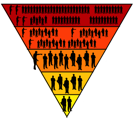STAY in TOUCH
Professional Developent

Credentials and Certifications

Certified Protection Professional (CPP): Through the American Society for Industry Security – ASIS International, the Certified Protection Professional (CPP) credential requires a combination of education, experience, and examination to become board-certified in security management. I obtained the CPP credential in 1993 and completed triennial recertification requirements for 1996, 1999, 2002, 2005, 2008 and 2011.
Nuclear Training Instructor: Through the Institute of Nuclear Power Operators (INPO), the National Academy of Nuclear Training provides classroom instructors with the requisite knowledge, skills and attitudes for analyzing, designing, developing, implementing and evaluating training activities. I became certified as an instructor for within the nuclear security organization at the Duke Energy Oconee Nuclear Site in 1986.
Private Security Legal & Firearms Instructor: Through the South Carolina State Law Enforcement Division (SLED), instructors are certified to conduct private security officer training for state mandated legal courses (Level I), firearms classroom training (Level II), and firearms range training and qualification (Level III). I became certified as an instructor completing security officer legal and firearms training at the Duke Energy Oconee Nuclear Site in 1986.
Nuclear Training Instructor: Through the Institute of Nuclear Power Operators (INPO), the National Academy of Nuclear Training provides classroom instructors with the requisite knowledge, skills and attitudes for analyzing, designing, developing, implementing and evaluating training activities. I became certified as an instructor for within the nuclear security organization at the Duke Energy Oconee Nuclear Site in 1986.
Private Security Legal & Firearms Instructor: Through the South Carolina State Law Enforcement Division (SLED), instructors are certified to conduct private security officer training for state mandated legal courses (Level I), firearms classroom training (Level II), and firearms range training and qualification (Level III). I became certified as an instructor completing security officer legal and firearms training at the Duke Energy Oconee Nuclear Site in 1986.
Police Crisis Negotiation

Instructor
- aDuke Energy, Oconee Nuclear Site - Crisis Negotiation Team Quarterly Training
- bOconee County, SC Sheriff's Office, Crisis Negotiation Team In-Service Training
- Show More
Lectures and Presentations
- aNorth Carolina Justice Academy, "Negotiation First Responder" - Continuing Education Seminar: Salisbury, NC
- bOconee County, SC Sheriff's Office, "Crisis Negotiation Scenario Development" - In-Service Training
- cPublic Agency Training Council, "Private Sector Negotiation" - Crisis Negotiation Course: Myrtle Beach, SC
- default_titlePickens County, SC Sheriff's Office, "Crisis Negotiation Concepts" - In-Service Training
- Show More
Scenario Development
- aDuke Energy, Oconee Nuclear Site - Crisis Negotiation Team Quarterly Training
- bOconee County, SC Sheriff's Office - Crisis Negotiation Scenario Development and Implementation
- cGreenville County, SC Sheriff's Office - Crisis Negotiation Scenario Development and Participation
- Show More
Training Courses
- aCrisis Negotiation - Basic (40 Hours): Institute of Police Technology & Management (IPTM)
- bCrisis Negotiation - Intermediate (40 Hours): Institute of Police Technology & Management (IPTM)
- cCrisis Negotiation - Advanced (40 Hours): Institute of Police Technology & Management (IPTM)
- default_titleManaging the Suicidal Crisis (24 Hours): Institute of Police Technology & Management (IPTM)
- default_titleHostage Negotiation - Phase I & II (36 Hours): Public Agency Training Council (PATC)
- default_titleHostage Negotiation - Phase III (21 Hours): Public Agency Training Council (PATC)
- default_titleHostage Negotiation (30 Hours): Institute of Public Service (IPS)
- default_titleCrisis Intervention for the Mentally Ill (40 Hours): National Alliance on Mental Illness (NAMI)
- Show More
Conferences and Seminars
- aCrisis Negotiation Conference: South Carolina Crisis Negotiators Association (SCCNA) - Myrtle Beach, SC
- bHostage Negotiation Seminar: International Association of Hostage Negotiators (IAHN) - Las Vegas, NV
- Show More
Incident Command and Control

- aIncident Command and Control (40 Hours): Institute of Public Service (IPS)
- bCrisis Negotiation Techniques for First Responders (40 Hours): Oconee County, SC Sheriff's Office (OCSO)
- cSpecial Weapons and Response Tactics (24 Hours): Greenville, SC Police Service Bureau (PSB)
- default_titleTactical Response Team Operations (40 Hours): Southern Nuclear Security
- Show More
Emergency Preparedness

- aEmergency Response Organization (ERO) Member - Duke Energy, Oconee Nuclear Site (1986-Present)
- bFederal Emergency Management Agency (FEMA): Homeland Security Course - University of Massachusetts
- cEmergency Planning for Hostile Action Based Incidents: Nuclear Energy Institute (NEI) - Alexandria, VA
- default_titleResearch Paper: The Performance of FEMA as a Standalone Agency within the Department of Homeland Security
- Show More
Cyber and Information Security

Education
- aPostgraduate Certificate in Cyber Security Management: University of Virginia (In Progress)
- Show More
Task Force and Assessment Team Membership
- aCyber Security Assessment Team Member - Duke Energy, Oconee Nuclear Site (2009-Present)
- bInformation Protection Task Force - Nuclear Energy Institute (NEI): Washington, DC (2008-2013)
- Show More
Conferences & Seminars
- aProtection of Nuclear Security Information: Nuclear Regulatory Commission (NRC) - Washington, DC
- b10 CFR 73.20 Safeguards Information Rule Implementation: Nuclear Energy Institute (NEI) - Chattanooga, TN
- cCyber Security for Commercial Nuclear Power Facilities: Nuclear Energy Institute (NEI) - Washington, DC
- Show More
- - - - Baltimore, MD (2009 - 2010 - 2011)
- - - - Washington, DC (2012)
- - - - Savannah, GA (2012 - 2013 - 2014)
- - - - New Orleans, LA (2015)
- - - - Washington, DC (2012)
- - - - Savannah, GA (2012 - 2013 - 2014)
- - - - New Orleans, LA (2015)
Training
- aProtection of Nuclear Plant Critical Digital Assets (CDAs) - Duke Energy Nuclear Generation Department (NGD)
- bCyber Security Protection for Critical Systems: GovSec TREXPO - Washington, DC
- cCybersecurity Awareness: Duke Energy, Nuclear Generation Department (NGD)
- default_titleInformation System Security: Duke Energy, Nuclear Generation Department (NGD)
- Show More
Law Enforcement and Security

Education
- aMaster of Arts in Criminal Justice (MACJ): Arizona State University
- bPostgraduate Certificate in Security Studies: University of Massachusetts
- cAssociate of Public Service in Criminal Justice: Tri-County Technical College
- default_titleMaster's Thesis: Performance of Police Order Maintenance Functions by Private Security Officers
- default_titleResearch Paper: The Use of Community Policing for the Prevention of Violent Extremism
- default_titleParalegal Coursework - Tri-County Technical College:
- Show More
- - - - Legal Terminology, Process, Ethics, Tort and Contract Law
- - - - Evidence, Legal Interviewing and Investigation
- - - - Legal Document and Analysis
- - - - Evidence, Legal Interviewing and Investigation
- - - - Legal Document and Analysis
Training
- aReserve Officer Training - City of Pickens, SC Police Department
- bPrivate Security Officer Training: South Carolina State Law Enforcement Division (SLED) - Oconee Nuclear Site
- cPrivate Security Officer Training: North Carolina Private Protective Services Board - McGuire Nuclear Site
- default_titleLess Lethal Defense Strategies: Anderson County, South Carolina Sheriff's Office (ACSO)
- default_titlePrivate Security Legal & Firearms Instructor: South Carolina State Law Enforcement Division (SLED)
- default_titleLegal Update for Security Instructors: South Carolina State Law Enforcement Division (SLED)
- default_titleDrug Recognition: Duke Energy Employee Assistance Program (EAP)
- default_titleCrisis & Hostage Negotiation:
- Show More
- - - - Crisis Negotiation - Basic (40 Hours): Institute of Police Technology & Management (IPTM)
- - - - Crisis Negotiation - Intermediate (40 Hours): Institute of Police Technology & Management (IPTM)
- - - - Crisis Negotiation - Advanced (40 Hours): Institute of Police Technology & Management (IPTM)
- - - - Managing the Suicidal Crisis (24 Hours): Institute of Police Technology & Management (IPTM)
- - - - Hostage Negotiation - Phase I & II (36 Hours): Public Agency Training Council (PATC)
- - - - Hostage Negotiation - Phase III (21 Hours): Public Agency Training Council (PATC)
- - - - Hostage Negotiation (30 Hours): Institute of Public Service (IPS)
- - - - Crisis Intervention for the Mentally Ill (40 Hours): National Alliance on Mental Illness (NAMI)
- - - - Crisis Negotiation - Intermediate (40 Hours): Institute of Police Technology & Management (IPTM)
- - - - Crisis Negotiation - Advanced (40 Hours): Institute of Police Technology & Management (IPTM)
- - - - Managing the Suicidal Crisis (24 Hours): Institute of Police Technology & Management (IPTM)
- - - - Hostage Negotiation - Phase I & II (36 Hours): Public Agency Training Council (PATC)
- - - - Hostage Negotiation - Phase III (21 Hours): Public Agency Training Council (PATC)
- - - - Hostage Negotiation (30 Hours): Institute of Public Service (IPS)
- - - - Crisis Intervention for the Mentally Ill (40 Hours): National Alliance on Mental Illness (NAMI)
Instructor
- aNuclear Security Officer Basic Training: Duke Energy, Oconee Nuclear Site
- bNuclear Security Officer Continuing Training: Duke Energy, Oconee Nuclear Site
- cCrisis Negotiation Team Continuing Training: Duke Energy, Oconee Nuclear Site
- default_titleDuke Energy, Oconee Nuclear Site - Crisis Negotiation Team Quarterly Training
- Show More
Lectures and Presentations
- aTri-County Technical College, "Nuclear Security Design Basis Threat" - Criminal Justice "Private Security" Course
- bNorth Carolina Justice Academy, "Negotiation First Responder" - Continuing Education Seminar: Salisbury, NC
- cPublic Agency Training Council, "Private Sector Negotiation" - Crisis Negotiation Course: Myrtle Beach, SC
- default_titleOconee County, SC Sheriff's Office, "Crisis Negotiation Strategies" - In-Service Training
- default_titlePickens County, SC Sheriff's Office, "Crisis Negotiation Concepts" - In-Service Training
- Show More
Homeland Defense

Education
- aPostgraduate Certificate in Critical Infrastructure Protection: Sam Houston State University (In Progress)
- bPostgraduate Certificate in Security Studies: University of Massachusetts
- cResearch Paper: The Performance of FEMA as a Standalone Agency within the Department of Homeland Security
- default_titleResearch Paper: Analysis of the United States Strategy for Combating Terrorism
- default_titleResearch Paper: The Use of Community Policing for the Prevention of Violent Extremism
- default_titleResearch Paper: Mission Statement for the Department of Homeland Security
- default_titleResearch Paper: Defining Homeland Security
- Show More
Training
- aExplosive Device Recognition: Police Department, City of Anderson, South Carolina (APD)
- bHazardous Material Identification: Oconee County Sheriff's Office (OCSO)
- Show More
Conferences & Seminars
- aEmergency Planning for Hostile Action Based Incidents: Nuclear Energy Institute (NEI) - Alexandria, VA
- bTerrorism, Political Instability & Criminal Acts: American Society for Industrial Security (ASIS) - Alexandria, VA
- cCritical Infrastructure Protection Measures: GovSec TREXPO - Washington, DC
- default_titleNuclear Security Design Basis Threat: Nuclear Energy Institute (NEI) - St. Pete Beach, FL
- Show More
Lectures and Presentations
- aAppalachian Council of Governments, "Nuclear Security in the Wake of 9-11", Upstate South Carolina
- bClemson University, "Nuclear Security Design Basis Threat" - Political Science "Era of Terror" Course
- cClemson University, "Nuclear Security in the Wake of 9-11" - Political Science "Era of Terror" Course
- Show More
Instructor Development

Education
- aMaster of Human Resource Development (MHRD): Clemson University
- bPostgraduate Certificate in E-Learning and Online Teaching: University of Wisconsin
- Show More
Training
- aTraining Instructor Certification: Duke Energy, Technical Training Center
- bInstructional Design and Lesson Plan Development: Duke Energy, Oconee Nuclear Site
- cTraining Needs Assessment and Task Analysis: Duke Energy, Technical Training Center
- default_titlePrivate Security Legal & Firearms Instructor: South Carolina State Law Enforcement Division (SLED)
- default_titleInstructor Continuing Training Sessions: Duke Energy, Oconee Nuclear Site
- Show More
Professional Service
- aCertified Protection Professional (CPP) Exam Development Group: American Society for Industrial Security (ASIS)
- Show More
Organizational Leadership

Human Error Reduction and Cause Analysis

Experience
- aTeam Facilitator - Root Cause Investigation: Duke Energy, Nuclear Generation Department (NGD)
- bTeam Member - Root Cause Investigation: Duke Energy, Nuclear Generation Department (NGD)
- cTeam Member - Apparent Cause Analysis: Duke Energy, Nuclear Generation Department (NGD)
- default_titleTeam Member - Nuclear Plant Problem Identification Report (PIR) Screening: Duke Energy, Oconee Nuclear Site
- Show More
Training
- aRoot Cause Investigation: National Academy for Nuclear Training, Duke Energy
- bApparent Cause Analysis: National Academy for Nuclear Training, Duke Energy
- cPerformance Improvement (PI) and Human Error Reduction (HER): Duke Energy, Oconee Nuclear Site
- default_titleCorrective Action Program (CAP) Oversight: Duke Energy, Oconee Nuclear Site
- default_titleAberrant Behavior Recognition: Duke Energy, Oconee Nuclear Site
- default_titleFitness for Duty (FFD) Evaluation: Duke Energy, Oconee Nuclear Site
- default_titleProblem Investigation Evaluation and Screening Methodology: Duke Energy, Oconee Nuclear Site
- Show More
Computer and Digital Literacy

- aVisual Studio for Data Access Solutions: Carolina Computer Training - Greenville, SC
- bCaptivate for Development of Computer Based Training (CBT): Sterling Ledet & Associates - Charlotte, NC
- cOnline Exam Development: Coastal Carolina University, Litchfield Education Center - Pawleys Island, SC
- default_titleSharePoint for Project Development: Carolina Computer Training (CCT) - Greenville, SC
- default_titleHyperText Markup Language (HTML) Fundamentals: Duke Energy Technical Training - Oconee Nuclear Site
- default_titleAccess Database Design: Duke Energy Technical Training - Oconee Nuclear Site
- default_titleOnline Learning Management Systems (LMS):
- Show More
- - - - Blackboard
- - - - Moodle
- - - - Brightspace D2L (Desire2Learn)
- - - - LinkedIn Learning (formerly Lydia.com)
- - - - Moodle
- - - - Brightspace D2L (Desire2Learn)
- - - - LinkedIn Learning (formerly Lydia.com)
Professional Group Affiliations

Present
United States Distance Learning Association (USDLA): The United States Distance Learning Association (USDLA) promotes the development and application of online education for K-12, colleges and universities, as well as the corporate training environment.
Academy of Criminal Justice Sciences (ACJS): The Academy of Criminal Justice Sciences (ACJS) is an international association established in 1963 to foster professional and scholarly activities in the field of criminal justice.
Alpha Phi Sigma (APS) National Criminal Justice Honor Society: The Alpha Phi Sigma Criminal Justice Honor Society recognizes the academic excellence of Undergraduate and Graduate students of Criminal Justice.
World Institute of Nuclear Security (WINS): The World Institute of Nuclear Security (WINS) provides an international forum for sharing best practices associated with the physical protection and security of nuclear and radioactive materials and facilities.
International Association of Hostage Negotiators (IAHN): The International Association of Hostage Negotiators (IAHN) provides information sharing, networking, and communication resources for individuals involved in the crisis negotiation process.
Academy of Criminal Justice Sciences (ACJS): The Academy of Criminal Justice Sciences (ACJS) is an international association established in 1963 to foster professional and scholarly activities in the field of criminal justice.
Alpha Phi Sigma (APS) National Criminal Justice Honor Society: The Alpha Phi Sigma Criminal Justice Honor Society recognizes the academic excellence of Undergraduate and Graduate students of Criminal Justice.
World Institute of Nuclear Security (WINS): The World Institute of Nuclear Security (WINS) provides an international forum for sharing best practices associated with the physical protection and security of nuclear and radioactive materials and facilities.
International Association of Hostage Negotiators (IAHN): The International Association of Hostage Negotiators (IAHN) provides information sharing, networking, and communication resources for individuals involved in the crisis negotiation process.
Past
American Society for Industrial Security (ASIS International): The American Society for Industrial Security, ASIS International, is a global community of security practitioners, each of whom has a role in the protection of assets - people, property, and/or information.
Association for Talent Development (ATD): The Association for Talent Development (ATD), formerly the American Society for Training & Development (ASTD), is an association of professionals who help others achieve their full potential by improving their knowledge, skills, and abilities in organizations of all sizes and in all industry sectors.
Association for Talent Development (ATD): The Association for Talent Development (ATD), formerly the American Society for Training & Development (ASTD), is an association of professionals who help others achieve their full potential by improving their knowledge, skills, and abilities in organizations of all sizes and in all industry sectors.
Icons: Think Stock Photos. (2018). Stock Photos, Images, - Thinkstock. http://www.thinkstockphotos.com

